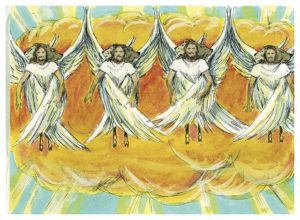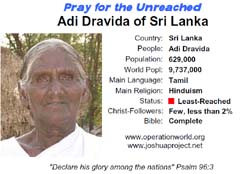TODAY’S READING FROM THE OLD TESTAMENT- EZEKIEL 10:1-11:25.
Ezekiel is speaking in apocalyptic language, the language of revelation. He is describing what he is seeing to the best of his ability, within the limits of human language. We read of ‘the likeness of a throne of sapphire’ over ‘the expanse’ that was over the heads of the living creatures, whom we are told for the first time in the Book of Ezekiel (Ezek 10:1) are cherubim, defenders of the holiness of God.
It is implied that ‘the likeness of the man’ (Ezekiel 1:5, 8:2), who is on ‘the likeness of the throne’ (Ezekiel 10:1), is the Lord God Himself. He gives a command to ‘the man clothed in linen’ to go in among the wheels beneath the living creatures, whom we now know are cherubim, and receive burning coals from them. He is to scatter them over the city.
Ezekiel watches this happen. The glory of the Lord moves to the threshold of the temple. The glorious chariot that appeared in Chapter 1 in Babylon is now in Jerusalem in Chapter 10. However, we get more details here. For example, we learn that the bodies and wings of the cherubim (10:12) as well as the wheels (1:18) are covered with eyes. This suggests God’s omniscience. He sees all and knows all. Each of the four wheels appear as a pair of intersecting wheels enabling the chariot to move in all directions. The direction of the faces and wheels appear to always be going in a direction that is straight forward, yet can target with pin-point accuracy and successfully arrive there.
A pivotal event is described in Ezekiel 10:20. The glory of the Lord departs from over the threshold of the temple and rises above the cherubim. It moves to the east gate and stops where 25 men who had turned their backs on the temple are plotting evil. (These are not the same as the men who were worshiping the sun (8:16). It is revealed that they have already killed many people in the city.
Jaazaniah was among them. He possibly was the brother of the false prophet Hananiah, who opposed Jeremiah and who delivered a similar false message of hope just before Jerusalem’s fall (Jeremiah 28:1-4).
The Lord tells Ezekiel to prophesy against these men. They will be driven out of the city, handed over to foreigners, and fall by the sword. “This city will be a pot for you and you will be the meat in it.” (11:11).
Ezekiel 11:12 12 and you shall know that I am the LORD. For you have not walked in my statutes, nor obeyed my rules, but have acted according to the rules of the nations that are around you.”
As Ezekiel is prophesying, one of the men, Pelatiah, son of Benaniah, dies. This was a confirmation of Ezekiel’s message and a foreshadowing of the death and destruction that would come to Jerusalem and its leaders.
Ezekiel pleads for mercy. “Will you completely destroy the remnant of Israel”?
Although judgment was coming, the Lord assures Ezekiel that a remnant will not be destroyed.
The presence of God in the sanctuary, the testimony of the Lord in the tabernacle, and temple, were great privileges in the history of Israel. But to whom much is given, much is required. God’s testimony is that He is holy. He is a covenant-keeping God. He keeps His promises. He does not leave the guilty unpunished. He has a provision to dispense mercy that will come through the cross of Christ. Ezekiel offers this message of hope:
Ezekiel 11:19-20 19 And I will give them one heart, and a new spirit I will put within them. I will remove the heart of stone from their flesh and give them a heart of flesh, 20 that they may walk in my statutes and keep my rules and obey them. And they shall be my people, and I will be their God.
Ezekiel 11:21 21 But as for those whose heart goes after their detestable things and their abominations, I will bring their deeds upon their own heads, declares the Lord GOD.”
The final picture in Ezekiel’s vision is that of the glory of the Lord departing from the city (with the wheels, cherubim, expanse, and enthroned Lord above) and going to the mountain east of it (The Mount of Olives).
Ezekiel then tells the exiles everything that the Lord has shown him (Ezekiel 10:25).
TODAY’S READING FROM THE NEW TESTAMENT – HEBREWS 6:1-20
The writer of Hebrews is encouraging his readers to grow and be secure in their understanding of the gospel. They are to go beyond the forerunning doctrines of the Old Testament to the culminating revelation of Christ and His perfect work of redemption.
The literal translation of the Greek language in Hebrews 6:1 is “Therefore, having left (once and for all) the elementary lessons of the teachings of Christ, let us press on to maturity.” The ‘elementary lessons’ refer to the foundational truths presented in Judaism. The writer describes them as ‘elementary instruction’ designed to help us to apprehend what we are to learn in the future, such as learning the alphabet before learning to read or learning the multiplication tables before learning to solve larger math problems. The foundational doctrines anticipated the coming of the Messiah. These are the components that John the Baptist spoke of when he called the Jews to ‘Prepare the way of the Lord’. Concepts presented in the Old Testament help us to understand how Christ fulfills them in the New Testament. The writer of Hebrews gives us a sample list of the important themes that are referred to in the Old Testament- repentance from dead works, faith toward God, instruction about washings, laying on of hands, the resurrection of the dead, and eternal judgment (Hebrews 6:1-2).
The author gives a strong warning that participation in religious rituals or merely professing to have faith is no substitute for genuine saving faith in Christ. There is no substitute for having transferred one’s faith to the True Substitute. To fall away from Christ is an indication that one has never been saved; their trust was rooted in something other than a solid conviction of the perfection of Christ and His work on the cross. Ultimately, they reject the free gift of salvation.
Remember the context of this letter. The writer is warning those Hebrew Christians who were tempted to find safety from anti-Christian persecution by returning to the relative safety of Judaism. Identifying as a Jew who did not trust Jesus as the Messiah had a special dispensation from the Roman government ‘s requirement to offer worship to the Emperor.
Jesus cannot be looked upon as merely a component of Judaism. He is the fulfillment of Judaism. There is no going back. Does a butterfly go back to being a caterpillar? Does a frog go back to being a tadpole?
In the light of Jesus’ teaching in the parable of the Sower and the Seed, what kind of soil will these Hebrews be for the good seed of God’s Word? Would they be like the seed that fell in the rocky soil, that failed to have a sufficient root to survive the trial of intense heat in the noon-day sun? Jesus explained the shallow-soil ‘professor of faith’ that falls short of being a ‘possessor of faith’ in Mark 4:16-17
Mark 4:16-17 16 “And these are the ones sown on rocky ground: the ones who, when they hear the word, immediately receive it with joy. 17 And they have no root in themselves, but endure for a while; then, when tribulation or persecution arises on account of the word, immediately they fall away.”
The writer makes it clear that there is no possibility to renew foundational repentance. You cannot be born again, again. You do not build a foundation twice. Foundational repentance is granted by the Spirit and involves a turning away from trusting in your own brand of justification, to God’s plan for justification, from trusting your own plan of salvation to trusting God’s plan of salvation. Saving faith involves trusting Jesus as our Lord and Savior, trusting God’s free gift of reconciliation through the propitiation provided by Jesus, the Messiah.
The nature of the new birth is that it is eternal. It does not have a short-lived profession. Those who say that they ‘used to be a Christian’ are self-deceived. They never were a Christian. The Bible teaches the doctrine of the perseverance of the saints.
Hebrews 6:4-6 4 For it is impossible, in the case of those who have once been enlightened, who have tasted the heavenly gift, and have shared in the Holy Spirit, 5 and have tasted the goodness of the word of God and the powers of the age to come, 6 and then have fallen away, to restore them again to repentance, since they are crucifying once again the Son of God to their own harm and holding him up to contempt.
The writer describes the case of a person who has been exposed to the gospel but has never personally submitted to it. They have never experienced what true salvation is (regeneration by the Spirit, baptism into the body of Christ, forgiveness of sins through faith in the atoning death evidenced by the shed blood of the Lamb and His resurrection, that proves the efficacy of that atonement).
The writer describes the case of one who has tasted but not swallowed. It is one thing to have heard ABOUT Jesus, experienced the good gifts of being ASSOCIATED with Him and His followers, and another to know that you belong to Jesus by the witness of the Holy Spirit. It is one thing to be inspired by His example and teaching, to have witnessed, or even personally benefitted from powerful miracles, and another to have experienced the miracle of the new birth. Remember that not all who experienced miracles believed that Jesus was the Christ. Not everyone who was healed trusted Him as their Lord and Savior. Of the ten lepers whom Jesus healed, only one came back to worship Him. Jesus asked, “Were not the ten cleansed, where are the nine?” (Luke 17:17) Jesus warned those who professed to be His followers and to have prophesied, cast out demons and performed miracles in His Name, “Depart from me, you who practice lawlessness, I NEVER knew you.” (He didn’t say “I used to know you, but don’t know you now”; see Matthew 7:21-23).
The miraculous works demonstrate the power of the kingdom age to come. But to have experienced these works is not a guarantee that one belongs to Christ.
The warning from the writer of Hebrews in Chapter 6:1-8 reminds us that we must be careful not to presume that everyone who makes a profession of faith in Christ, or is a regular churchgoer, is truly saved. Each one should make their hope sure by looking to Jesus (Hebrews 6:11). Salvation is by grace alone, through faith alone, in Christ alone. And when we are saved, our faith will not be alone but will bring forth the fruits of righteousness, a changed life. Having been regenerated and sealed in a faith union with Jesus by the Spirit (Ephesians 1:13), baptized by the Spirit into the body of Christ (1 Cor 12:12) and made a new creation, we will bring forth the accompanying results of His indwelling presence, rather than the cursed sin nature with its thorns and thistles (Hebrews 6:7-8).
The writer of the Letter to the Hebrews is confident that the profession of faith in the Lord Jesus Christ in the lives of his readers is real, and that they will bring forth solid evidence that accompanies salvation- — the fruit of the Spirit. They will display a life that is surrendered to the Lordship of Christ. He is confident that genuine believers will not apostatize.
Hebrews 6:9-10 9 Though we speak in this way, yet in your case, beloved, we feel sure of better things—things that belong to salvation. 10 For God is not unjust so as to overlook your work and the love that you have shown for his name in serving the saints, as you still do.
TODAY’S READING FROM THE BOOK OF PSALMS – PSALM 105:16-36
The Psalmist is recalling the history of Israel in which the Lord fulfills His promise to make the descendants of Jacob a great nation. He recounts the story of Joseph, God’s chosen instrument for the deliverance of His brothers. God called for a famine in the land. Joseph was mistreated by his brothers, sold into slavery in Egypt. In all his trials, the Word of God was proved to be true. He suffered the humiliation of false charges and imprisonment. But God used all these circumstances. And by exalting Joseph to the right hand of Pharaoh, Joseph became God’s agent of deliverance in the lives of the Egyptians as well as his brothers and father.
However, future generations of Egyptian leaders did not remember Joseph, and they subsequently oppressed the Israelites and subjected them to slavery.
In verse 26, the Psalmist speaks of Moses and Aaron as God’s chosen instruments in the exodus. Yet it was the Lord who is the true deliverer. He brought glory to His Name with the wonders of the 10 plagues and by delivering His people from their bondage in Egypt.
TODAY’S READING FROM THE BOOK OF PROVERBS – PROVERBS 27:1-2
Proverbs 27:1-2 1 Do not boast about tomorrow, for you do not know what a day may bring. 2 Let another praise you, and not your own mouth; a stranger, and not your own lips.
Two very wise proverbs. Remember that you do not have the final say. God is in control. Do not boast. God knows the future, and God will judge.
James 4:13-14 13 Come now, you who say, “Today or tomorrow we will go into such and such a town and spend a year there and trade and make a profit”— 14 yet you do not know what tomorrow will bring. What is your life? For you are a mist that appears for a little time and then vanishes.
PRAY FOR THE NATIONS- SRI LANKA
Sri Lanka
Democratic Socialist Republic of Sri Lanka
Asia
Area: 65,610 sq. km
Large island 80 km southeast of India.
Population: 20,409,946 Annual Growth: 0.88%
Capital: Colombo
Urbanites: 15.1%
HDI Rank: 102 of 182 (UN Human Development Reports 2009)
Peoples: 76 (84% unreached) All peoples
Unreached Peoples Prayer Card
Official language: Sinhala and Tamil, with English as the link language Languages: 7 All languages
Religion
Largest Religion: Buddhist
| Religion | Pop % | Ann Gr | |
| Christians | 1,710,353 | 8.38 | 0.8 |
| Evangelicals | 242,965 | 1.2 | 2.3 |
| Buddhist | 14,291,044 | 70.02 |
Answer to Prayer
The anti-conversion bill was not brought to pass, not so much defeated as deferred. Its implementation would bring difficulties for a number of minorities, but especially for evangelicals seeking to share the good news. Praise God that it has not yet become reality; pray that it may never become so.
Challenge for Prayer
Sri Lanka has suffered much in the past generation. From the constant threat of the Sinhala-Tamil conflict to the tsunami of 2004 to the civil war’s bloody conclusion in 2009, over 100,000 people have lost their lives, over 900,000 (mostly Tamils) emigrated or fled, and over one million are displaced. Points for prayer:
a) A resolution of the long-term conflict between Tamils and Sinhalese. Defeating the LTTE as a force means little if enmity, resentment, and rebellion are still brewing. Key players are the Sri Lankan government, the former LTTE core members, the Sri Lankan Tamil diaspora and even India and China. Power sharing may be the only way to long-term peace. A new constitution is being considered, one to resolve ethnic antipathy and return the nation to a more secular status with no religious favoritism. Pray that wise heads may prevail and that peace, reconciliation, and freedom for religious minorities might take precedence over ethnocentrism, prejudice, and pride.
b) A government that will work toward transparency, justice, and the fair representation of all communities and their civil, economic, and religious rights. Corruption and nepotism are too common. Post-2009, courageous decisions have been and will need to be made to oversee the healthy stewardship and development of this nation.
c) The handling of immense human needs in the aftermath of the civil war. Former LTTE fighters need to be reintegrated into society, the many injured and maimed government soldiers must be rehabilitated and given new vocations, orphans and widows must be cared for and half a million who were displaced need to be returned to their homes to rebuild their lives.
d) The fight against the many growing social ills:
i The plight of children – malnutrition, selective abortion/female infanticide or abandonment, abuse (including sexual abuse), and child prostitution (including sex tourism) are evils that are sadly making names for themselves in Sri Lanka.
ii Sri Lankans working abroad, especially in the Middle East and Gulf regions, are vulnerable to abuse and exploitation, especially since most of them are female domestic helpers. There are up to 700,000 such women willing to endure the risk in order to earn enough to send remittances home. Their absence is often very difficult on the children they leave behind.
iii Threats to traditional Sri Lankan culture include alcoholism, suicide, casual violence, and rape.
PRAYER: Lord, we want to press on to maturity. We thank You for the Scriptures that foretell us of the perfect provision of Your Son and His sacrifice for us on the cross. Having embraced Him by faith as our Lord and Savior, we desire to grow and bring forth fruit that bears witness to the indwelling presence of the Holy Spirit. Mold us, make us, fill us, and use us. In Jesus’ Name. Amen.


